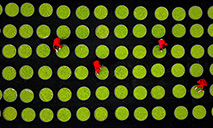Feeding on turmoil: Washington's tactics on Ukraine crisis
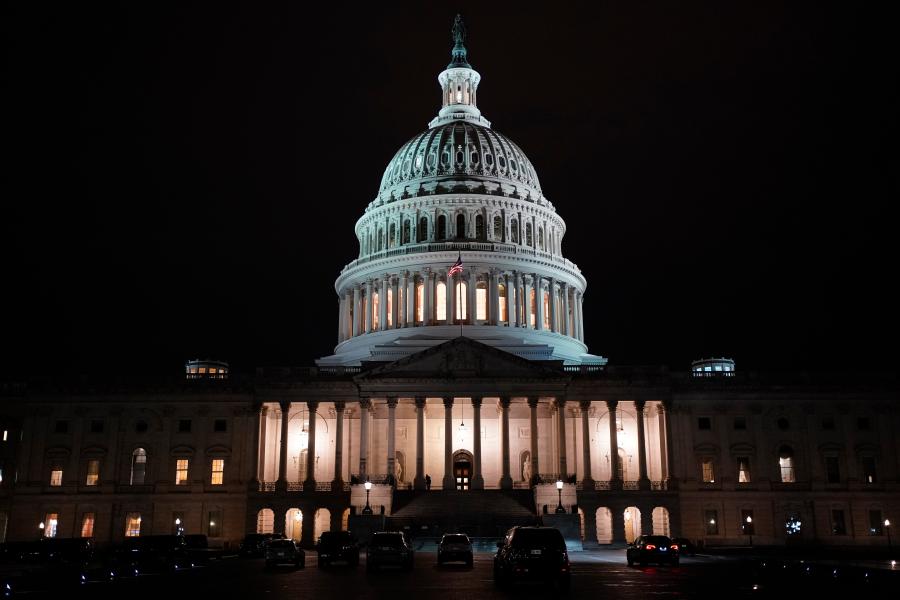
Photo taken on Nov. 19, 2021 shows the U.S. Capitol building in Washington, D.C., the United States. (Photo by Ting Shen/Xinhua)
--Washington's relentless fanning the flames, shirking of responsibilities, and throwing of dirt have cast an ominous shadow on any possible de-escalation.
--Washington is wilfully driving the train of Ukraine's future not toward peace, but all speed ahead into a future riddled with more uncertainties and untold suffering.
In his high-stakes trip to Poland last week, US president Joe Biden was scheduled to meet with leaders from Europe to discuss the response to the "humanitarian and human rights crisis" arising from the over month-long Russia-Ukraine conflict. At least that was what a White House statement prior to Biden's visit read.
The response—it turned out—was a cascade of personal attacks targeting Vladimir Putin, his Russian counterpart, together with an insinuation that the US would respond "in kind" if chemical weapons were deployed, and backtracking from his campaign promise to only use the US nuclear arsenal as a defensive last resort.
His flabbergasting remarks, which were described by many as a "gaffe," have drawn harsh criticism both at home and abroad. James Freeman, a Wall Street Journal columnist, half-jokingly commented that Americans would all be much safer if their president "would make greater use of prepared statements on subjects such as, for example, weapons of mass destruction." Even former US President Donald Trump, who is famous for his imprudent and often impromptu political language, slammed his successor's rhetoric as provocative.
European leaders have also expressed their deep concerns over Biden's fiery speech while distancing themselves from it. French President Emmanuel Macron, who in the past months had been busy mediating between Russia and Ukraine, expressed that such inflammatory rhetoric went against the joint efforts for a ceasefire and could possibly throw future negotiations into jeopardy.
Despite that high-level US officials have come forward several times to clarify that Washington harbored no intentions of using chemical weapons and sought no regime change in Russia, the international community, including American allies, has grown increasingly wary and confused with Washington's stance on the Russia-Ukraine conflict.
Is the US willing to help allay the tensions and deescalate the situation? Or is it determined to fuel the flames and incite even fiercer confrontations? Seen from Washington's inflammatory rhetoric and actions, it has apparently chosen the latter course.
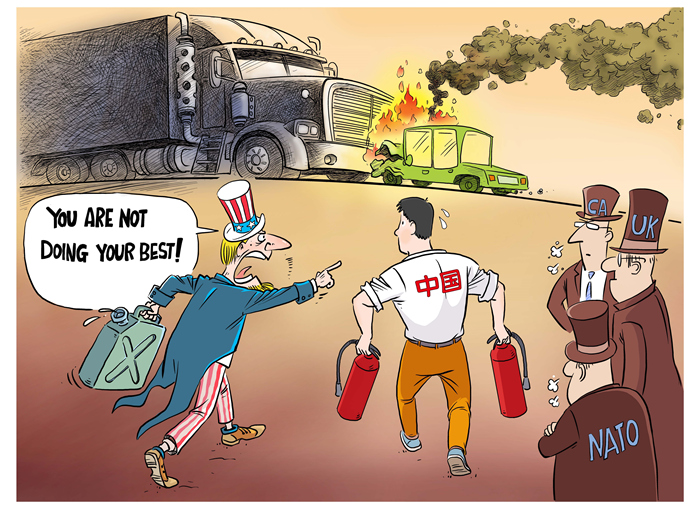
(Cartoon by Ma Hongliang)
Quelling fires with fuel
Since the Ukraine conflict broke out over a month ago, the US has deployed over 12,000 troops to the periphery of Ukraine and pledged to send more armed forces to Eastern Europe. This week, when a knifes-edge peace talk was held between Russia and Ukraine, the general in charge of American forces in Europe hinted that the US would still need more troops in the region even after the Russia-Ukraine conflict begins to wane.
At a time when NATO's expansion, together with its defense budget hikes and military build-ups, served as a prelude to the seemingly irreconcilable Ukraine crisis, Washington has intended to reinforce the vicious circle, paving the way for yet more budget hikes, more military build-ups to maintain its extreme pressure on Russia that lies at the root of the crisis.
[Related Reading: Cold War-minded U.S. eyes more military spending to sustain hegemony amid geopolitical tensions]
As Tulsi Gabbard, a former US Congresswoman who once served in Iraq sharply and correctly pointed out, the crisis and suffering "could have easily been avoided if the Biden administration and NATO had simply acknowledged Russia's legitimate security concerns regarding Ukraine's becoming a member of NATO, which would mean US/NATO forces right on Russia's border."
In a recent interview on Fox News, Gabbard reiterated her belief that Washington had purposely, as it always did, fanned the flames of the conflict instead of helping to mollify it. "The strategy and tactics are the same as our (America's) previous regime change wars: inflicting severe hardship and suffering on the population in order to incite revolt and chaos," she highlighted.
Washington has posed as an arbitrator, a peacekeeper in the Ukraine crisis, and a ballast of stability and security in Europe, but it has failed to acknowledge the culpable roles it played in the Russia-Ukraine crisis and the protracted instability of the region.
NATO's five waves of expansion, American and NATO leaders' luring Ukraine into the military alliance, together with NATO's growing military budgets and deployment of troops and defense systems near Russia's doorstep, have not only undermined the strategic autonomy of Europe, enticed paranoia and an unnecessary arms race (even a nuclear one) around the entire world, but also have given rise to disastrous scenarios like the Ukraine crisis that the US and NATO had purported to wish to prevent.
The US branded NATO as a shield, a stabilizer, as well as an umbrella, but it could never erase the military alliance's notorious record of unjustified bombings in Yugoslavia or its inglorious involvement in Iraq, Afghanistan, and Syria.
The US may feel complacent about a rare moment of unity among NATO member states, including the unparalleled military and economic clout it can wield, but as long as the crux of the crisis remains—Washington and NATO's overreaching and bellicose stance—then conflicts and suffering will persist. The US cannot expect to put up the fire with fuel.
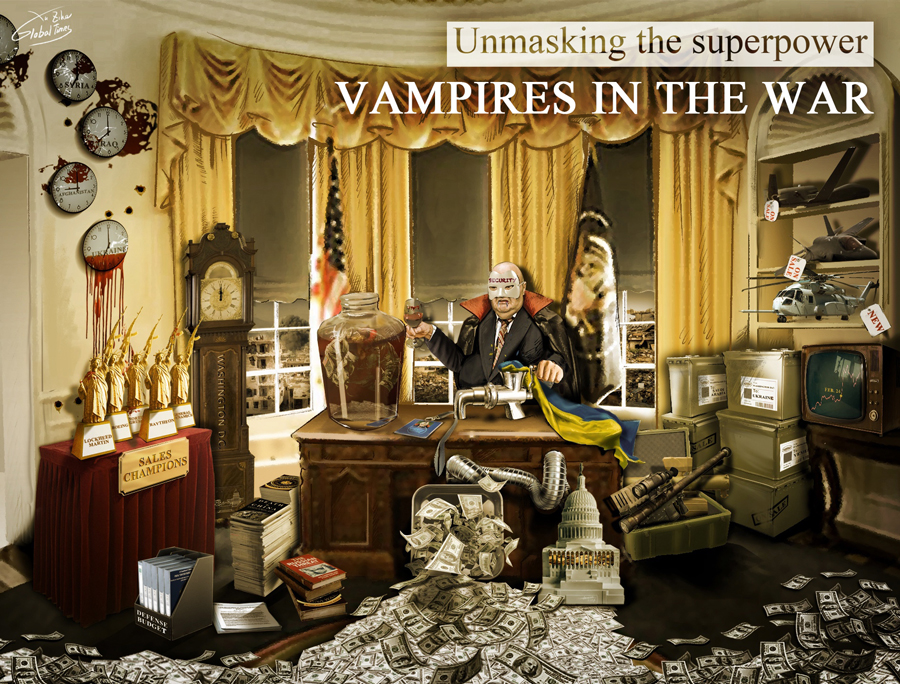
Unmasking The Superpower: Vampires in the war Illustration: Xu Zihe/GT
Fishing in troubled waters
"People say the Pentagon does not have a strategy. They are wrong. The Pentagon does have a strategy. It is 'Don't interrupt the money flow, add to it,'" as so famously said by John Boyd, a former Pentagon consultant and military strategist during the second half of the last century.
America's motto of feeding on turmoil and profiting from conflicts, which was upheld during the Persian Gulf War, America's invasions of Afghanistan and Iraq, and its military interventions in Syria and Libya, etc., is still enshrined in the heart of the US military to this day and couldn't be more relevant and explanatory as regards Washington's stance on Ukraine.
The US may continue complaining about surging oil prices, but it can't deny that it is the nation—probably the sole nation—standing to gain from the Russia-Ukraine conflict.
One needs to look no further than Wall Street. Even though the US market has, overall, ebbed and flowed with the developments of the Ukraine conflict, its defense stocks have risen significantly, especially upon hearing the news that Germany, along with other NATO member states, would massively hike their defense budgets, increases Washington had been eager to see for years.
Axon Enterprise, Boeing, and Lockheed Martin, coupled with other US aerospace and weapons manufacturers, have seen strong performances and rosy outlooks with the unfolding Ukraine conflict. Lockheed Martin, the world's largest weapons manufacturer, registered a 25 percent increase since the beginning of this year. Boeing, which invests heavily in the defense industry, has predicted a 31 percent 12-month upside potential.
[Related Reading: U.S. arms companies make big fortune amid Russia-Ukraine conflict]
Wherever the Russia-Ukraine conflict may go, America's defense giants will undeniably make big bucks for the financial elites, much like they always do when America's war machine is ratcheted up globally, or when the US is busy handing over lethal weapons to intensify the tragedies of the Middle East or spell more trouble in the Asia-Pacific region.
Washington may again gamble on a geopolitical endgame from which it has little to lose and much to gain, but with its dangerous and reckless words and deeds, it has also dragged Ukraine and Russia, with the latter being a nuclear power, toward the cliff of a more brutal confrontation, a scenario where there is no turning back.

(Cartoon by Ma Hongliang)
Throwing dirt
American politicians and media outlets, almost in tandem with the Ukraine conflict, have continued circulating and spewing out anti-China disinformation that is simply fake.
Starting earlier last month, the New York Times, joined by other mainstream media outlets, falsely claimed that Chinese officials had "known" beforehand about Russia's plans for the conflict. Their evidence? An unsubstantiated "Western intelligence report." Their source? Several unnamed officials. Apparently, America's disinformation machine has never once run out of steam with the same fuel.
Less than two weeks later, American media outlets cooked up something richer and even more fantastical. This time, they cited a US intelligence official who suggested that China "has expressed some openness to providing Russia with requested military and financial assistance," as CNN reported. To even consider giving an official response to such a pure fabrication was not worth the time. Yet, Chinese officials have on multiple occasions shown their utmost patience in debunking the flagrant and sinister lies of the Americans.
Then, last month, the New York Times published a preposterous analytical article headlined "China Takes a Back Seat in International Diplomacy Over Ukraine," in which it suggested that "China has repeatedly called for peace talks in Ukraine," while adding that "What it has not done is press Russia to negotiate." It is somewhat of a relief to see that the Times used the word "negotiate" instead of "sanction." But their tone seems to suggest that China somehow has a greater ability to sway Russia or press the "stop" button on the conflict than either the US and most of its Western allies combined might have.
In the American media's warped narratives on the Russia-Ukraine conflict, the US is whitewashed as a mediator, a peacekeeper, and a savior who protects the vulnerable from utter despair, while China is blackwashed as the nation that "stands aloof," "waits and sees," and hesitates to "act."
But in reality, China's stance on Ukraine has been consistent and clear-cut from the outset: it seeks to promote peace talks rather than carry out indiscriminate sanctions or set up obstacles for possible de-escalation; it acts to provide emergency humanitarian assistance to Ukraine instead of supplying lethal weapons; it strives to foster lasting peace in Europe and the Eurasian continent rather than get stuck in the Cold War mentality and remain obsessed with expanding geopolitical clouts and forging military alliances.
On the contrary, America's sanctions stick and bellicose rhetoric are only worsening the situation, narrowing the window for a possible clawback from escalation, and steering Ukraine and Russia away from the negotiating table.
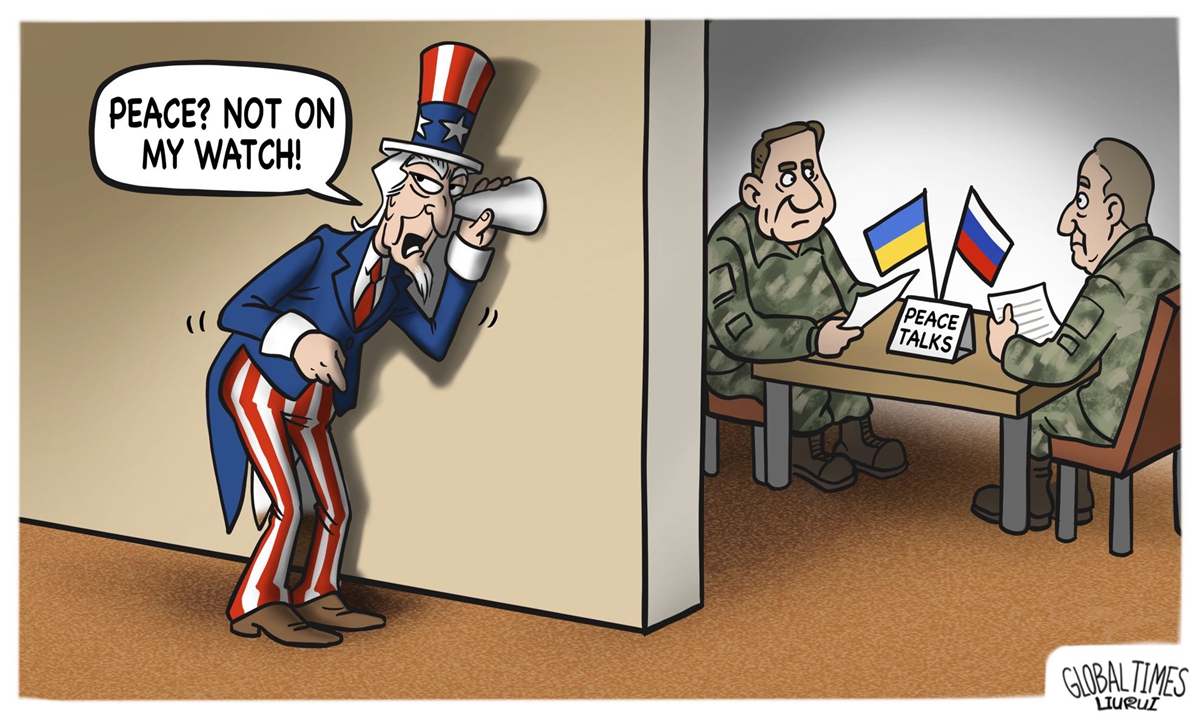
Peace talks Illustration: Liu Rui/GT
***
As the Russia-Ukraine conflict enters its seventh week, the international community is counting on the hard-won yet fragile peace talks between the two sides. But Washington's relentless fanning the flames, shirking of responsibilities, and throwing of dirt have cast an ominous shadow on any possible de-escalation. As the driver that caused multiple train wrecks in the past, Washington is wilfully driving the train of Ukraine's future not toward peace, but all speed ahead into a future riddled with more uncertainties and untold suffering.
Photos
Related Stories
Copyright © 2022 People's Daily Online. All Rights Reserved.










